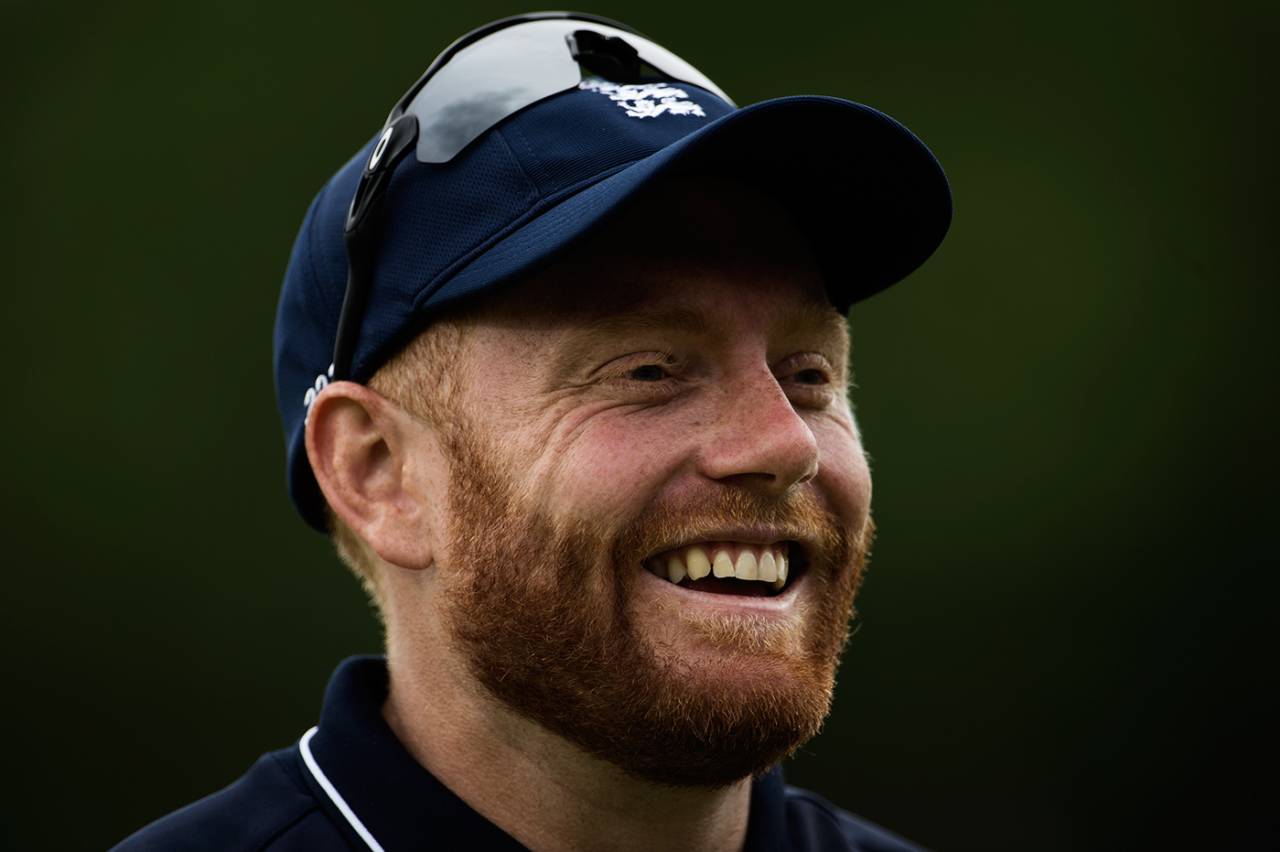The story of Jonny and Bluey and of love and letting go
Jonny Bairstow's book is nothing like the modern player autobiography
David Hopps
Nov 5, 2017, 2:30 AM

Jonny Bairstow has lived much of his life under the shadow of his father's death, but with this book, he might emerge out of it • Getty Images
For Jonny Bairstow merely to pursue a cricket career has been an act of courage. Not because of 90mph balls flying at his head, or the occasional barbs of criticism from media or spectators alike. Purely because of something far more raw and disturbing than that as he trod in the footsteps of his father, who nearly 20 years ago committed suicide by hanging himself from the banisters in the family home in north Yorkshire.
Blessed with a thumping drive through extra cover you might be, but how do you concentrate on honing it when, since you were eight years old, the memory of Bluey has pervaded every net, every dressing room and, as the years develop, just about every boozer you care to visit? When by donning wicketkeeping gloves the reminders become even more apparent.
When whatever you do, and however you achieve it, for many spectators, especially in Yorkshire, the story is not just of you, but of the father you have lost in such shocking circumstances, one of the most popular, belligerent, heart-on-the-sleeve cricketers ever to wear the White Rose. A man "built like a muck stack," as Bairstow - or his ghost - has it.
For Jonny Bairstow, the grieving process has been a long one, but perhaps A Clear Blue Sky, written in conjunction with Duncan Hamilton, offers some sort of closure. The face on the front and back covers is of Jonny, with an Ashes tour in wait, but the central character is assuredly Bluey. David Bairstow, told though the eyes of the son who lost him.

David Bairstow's story is told from his family's point of view•PA Photos/Getty Images
"My dad's always here," he reflects. "That decent bloke lives on in our memory of course, but also in the memory of so many others… Most of all, I hope, he lives in the book you're holding: for that is the point of it."
The outcome is an extraordinary book, far removed from the usual expectations of a ghosted cricket biography. More than half the pages tell his father's story, and even when they don't, his father is never very far away.
A Clear Blue Sky is a eulogy, on behalf not just of Jonny but his mother Janet, who works as an administrator in the Yorkshire offices, and sister Becky. It is the book of a man who has stopped searching for explanations and who instead has found love and forgiveness. It is deeply personal. Perhaps it will now help him happily to live out the rest of his own career in his own image and one imagines that can only be a good thing. Bairstow admits that the family "stewed over" whether to write this book, but as many might conclude in his home county, it's good that he's got it out there.
Jonny is fiercely protective of his mother. Soon after the funeral, he tried to grow into the role of father and told Janet that the family would be all right. "With my dad gone, I made a resolution to myself. I would become the man of the house." When he states "I am my mother's son," he could hardly sound more emphatic. His father's suicide came soon after Janet learned she had breast cancer. Jonny once left an England tour of India to be at her bedside as she faced a second operation when the cancer returned. The bonds run deep.

HarperCollins
Bairstow's ability to talk about his father has passed through several stages. His Yorkshire debut, when questions about his father were protectively ruled off limits; a maiden Test century in Cape Town, where his father spent so many off seasons, an innings where he wants to honour his dad, but thank the rest of the family even more.
But arguably the most emotional moment comes when he is approaching his 17th birthday, on a "lads' jolly" in Cornwall. On a beach in Newquay, he has to tell a group of strangers in general conversation that his father has passed away and receives "a low laugh… as if death is hilarious" in reply and flees up the beach where he sobs uncontrollably on a low stone wall in the company of his best and oldest friend.
"It was finally time for me to let go," Bairstow concludes, "releasing what I'd consciously suppressed." But the effects will always linger. It is striking how in A Clear Blue Sky the stories of camaraderie come almost entirely from family and close friends. There are few tales of the sort of dressing-room bonds, either with Yorkshire or England, that pervade so many ghosted cricket books. Tests won, or County Championships secured, have limited resonance. One incident consumes all.
Which brings us to the ghost. Hamilton, who has twice won the William Hill Sports Book of the Year award for studies of Brian Clough and Harold Larwood, ensures that the passages on love and loss are told with skill and sensitivity, at times heartrendingly so, but ghostwriting can be a frustrating art, as much about subjugating oneself as revealing others. It has been observed elsewhere, with some justification, that his voice occasionally intrudes more than it should. But he has delivered a deeply personal story nonetheless and, who knows, perhaps along the way has helped to provide Jonny Bairstow a platform from where he can achieve great things.
A Clear Blue Sky
By Jonny Bairstow and Duncan Hamilton
Harper Collins
By Jonny Bairstow and Duncan Hamilton
Harper Collins
David Hopps is a general editor at ESPNcricinfo @davidkhopps